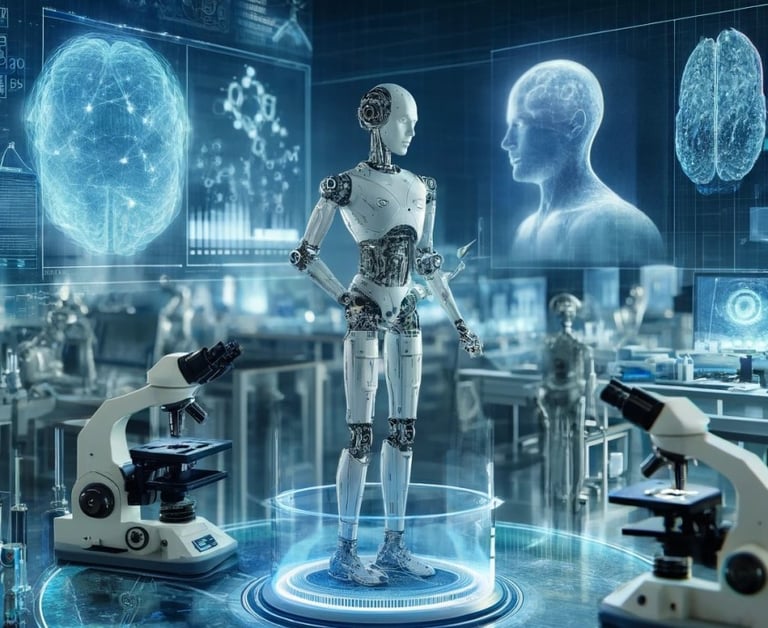Embracing the Rise of the Automated Scientist: Transforming Academics, Society, and Industry
The emergence of the Automated Scientist marks a pivotal shift in how we approach knowledge acquisition and innovation. Free from human biases, this AI-driven entity accelerates discovery by analyzing vast amounts of data objectively. It collaborates with human researchers, democratizes access to knowledge, and revolutionizes industries from healthcare to finance. However, its deployment necessitates careful ethical considerations to ensure equitable benefits across society. Embracing the Automated Scientist promises transformative advancements, but requires vigilance in guiding its ethical implementation for the common good.
Matthew Alberts, PH.D.
4/10/20242 min read


In the pursuit of innovation and knowledge, humanity has long grappled with the limitations of our own cognitive biases and preconceived notions. The late Daniel Kahneman articulated the necessity of humility in approaching new information, emphasizing the importance of evaluating it on its own merits rather than confirming entrenched beliefs. However, as our understanding of cognitive processes deepens, it becomes increasingly apparent that these biases are deeply ingrained within us, often hindering rather than facilitating true learning and progress.
The emergence of the concept of the Automated Scientist represents a shift in our approach to knowledge acquisition and innovation. Unlike its human counterparts, this AI-driven entity is not burdened by the same cognitive shortcuts and biases that plague human cognition. Instead, it possesses the capacity to analyze vast amounts of data without succumbing to emotional prejudices or preconceived notions. In doing so, it offers a glimpse into a future where the pursuit of knowledge is truly objective and unbiased.
One of the most compelling aspects of the Automated Scientist is its ability to collaborate seamlessly with human researchers, augmenting rather than replacing their capabilities. By leveraging its unparalleled analytical prowess, the Automated Scientist can identify patterns and insights that may elude human researchers, thereby accelerating the pace of discovery across a myriad of disciplines.
However, the advent of the Automated Scientist also raises profound questions about the nature of expertise and the role of human agency in an increasingly automated world. How do we establish trust in a system that operates beyond the realm of human understanding? What safeguards need to be put in place to ensure that the insights generated by the Automated Scientist are both accurate and ethical? These are complex questions that demand careful consideration and interdisciplinary collaboration.
In academia, the impact of the Automated Scientist is likely to be profound. It has the potential to democratize access to knowledge, allowing researchers from diverse backgrounds to leverage its capabilities in their quest for discovery. Moreover, by transcending the limitations of human cognition, the Automated Scientist may unlock entirely new avenues of inquiry, leading to breakthroughs that were previously unimaginable.
In society, the implications of the Automated Scientist extend far beyond the realm of academia. From healthcare to finance to environmental sustainability, its analytical prowess has the potential to revolutionize virtually every aspect of human endeavor. However, this transformation will not be without its challenges. As we embrace the rise of the Automated Scientist, we must remain vigilant in safeguarding against unintended consequences, ensuring that its deployment is guided by ethical principles and a commitment to the common good.
In industry, the Automated Scientist represents a game-changer in terms of efficiency and innovation. By harnessing the power of AI-driven analytics, companies can gain a competitive edge in an increasingly data-driven marketplace. From drug discovery to supply chain optimization, the possibilities are virtually limitless.
The rise of the Automated Scientist heralds a new era in the pursuit of knowledge and innovation. By transcending the limitations of human cognition, it offers the promise of a more objective and unbiased approach to discovery. However, realizing this potential will require careful stewardship and a commitment to ensuring that the benefits of this technology are shared equitably across society. Only then can we truly harness the transformative power of the Automated Scientist for the betterment of humanity.
I love reading the posts of Michael Carroll and Ron Norris on here as well as many others that inspire so many to think about these initiatives and impacts they will have on our personal and professional lives. These two inspire learning and push me and many others to learn about these concepts that will impact us all.
